
Discover the Wonders of Itaipu Biological Refuge
Experience the beauty and biodiversity of Itaipu Biological Refuge, a vital sanctuary for wildlife and a paradise for nature lovers in Foz do Iguaçu.
Itaipu Biological Refuge is a stunning wildlife sanctuary located in Foz do Iguaçu, Brazil. This unique destination not only offers a chance to connect with nature but also serves as a crucial conservation area for many endangered species. Visitors can explore beautiful trails, observe diverse flora and fauna, and learn about the importance of environmental protection in this breathtaking refuge.
A brief summary to Itaipu Biological Refuge
- Av. Tancredo Neves, 6702 - 07, Foz do Iguaçu, Jardim Itaipu, State of Paraná, 85856-970, BR
- +55453198-1800
- Visit website
- Monday 8:30 am-3:30 pm
- Wednesday 8:30 am-3:30 pm
- Thursday 8:30 am-3:30 pm
- Friday 8:30 am-3:30 pm
- Saturday 8:30 am-3:30 pm
- Sunday 8:30 am-3:30 pm
Local tips
- Plan your visit during early morning or late afternoon for the best wildlife sightings.
- Wear comfortable shoes and bring water, as the trails can be long and winding.
- Check the refuge's operating hours before your visit, as they may vary seasonally.
- Consider joining a guided tour for a more informative experience about the local ecosystems.
Getting There
-
Car
From Iguazu National Park, take the main access road (Ruta 101) towards Foz do Iguaçu. Continue straight for about 10 km until you reach the junction with Avenida das Cataratas (BR-469). Turn left onto Avenida das Cataratas and continue for approximately 6 km until you reach Avenida Tancredo Neves. Turn right onto Avenida Tancredo Neves. The Itaipu Biological Refuge will be located on your left at number 6702. Make sure to check the parking availability before you go.
-
Public Transportation
From the main entrance of Iguazu National Park, you can catch a bus heading to Foz do Iguaçu. Look for the bus marked 'Ciudad del Este'. You should ask the bus driver or check with the ticket counter for the correct stop to get off at Avenida Tancredo Neves. After approximately 30 minutes, get off at the stop closest to Avenida Tancredo Neves. From there, you can either walk (about 10 minutes) to Itaipu Biological Refuge or take a local taxi for a quicker route.
-
Taxi
If you prefer a more direct route, you can take a taxi from any location within Iguazu National Park to Itaipu Biological Refuge. Just tell the driver to take you to 'Av. Tancredo Neves, 6702, Jardim Itaipu'. The ride should take around 20 minutes depending on traffic, and you can expect to pay around 50-70 ARS (Argentinian Pesos) for this service.
Discover more about Itaipu Biological Refuge
Iconic landmarks you can’t miss
Elder
3.3 km
Discover the rich history of Hernandarias at Elder, a captivating historical landmark that showcases the area's architectural heritage.

Bisinii Hotel Boutique
5.6 km
Experience the charm of Hernandarias at Bisinii Hotel Boutique, where elegance meets comfort in a vibrant Paraguayan setting.

Iglesia Filadelfia Fuente de Restauración
5.7 km
Explore spirituality and community at Iglesia Filadelfia Fuente de Restauración in Hernandarias, a welcoming church that connects locals and visitors.

Casa Viva
5.8 km
Discover the serene charm of Casa Viva, a tranquil hotel in Hernandarias, Paraguay, offering comfort, culture, and local hospitality.

La Wayaba
6.2 km
Experience the warm hospitality and serene atmosphere of La Wayaba, the perfect hotel retreat in Hernandarias, Paraguay for travelers seeking relaxation and adventure.

Plaza de los Heroes
6.5 km
Explore the beauty and tranquility of Plaza de los Heroes in Hernandarias, a perfect park for relaxation, culture, and local encounters.

André Renato Kayak
6.6 km
Discover the beauty of Costa Rica's waterways at André Renato Kayak, where adventure awaits for paddlers of all skill levels in Hernandarias.
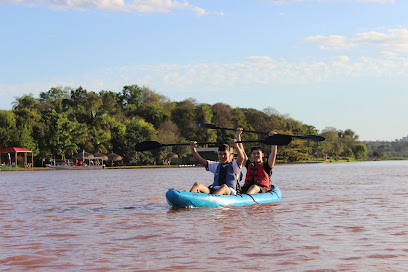
Blumenau Malhas
7.2 km
Explore Blumenau Malhas, a vibrant clothes market in Foz do Iguaçu, and discover a world of fashion at unbeatable prices amid a lively shopping atmosphere.

Playa Costanera Hernandarias
7.2 km
Experience the serene beauty of Playa Costanera Hernandarias, a captivating beach pavilion on the Paraná River offering relaxation and stunning views.

Quinta Piro’y Hernandarias
7.4 km
Discover the natural beauty and outdoor adventure at Quinta Piro’y in Hernandarias, a perfect retreat for families and nature lovers.

Church of Jesus Christ of Latter Day Saints
7.4 km
Discover spiritual serenity at the Church of Jesus Christ of Latter Day Saints in Hernandarias, a welcoming place for reflection and community engagement.

IGLESIA MONTE DE SIÓN. Centro de Hrias B° LAS MERCEDES TEMPLO PALOMA BLANCA
7.4 km
Discover the serene beauty and cultural significance of Iglesia Monte de Sión in Hernandarias, a captivating church steeped in local tradition.

Foz do uguaçu
7.5 km
Explore Foz do Iguaçu, a stunning historical landmark, where the majestic Iguaçu Falls and rich culture await every traveler.

Monalisa Paraguay
7.5 km
Explore Monalisa Paraguay in Ciudad del Este for an unparalleled shopping experience, rich with local culture and exceptional deals on diverse products.

Casa Ypacarai
7.7 km
Explore Casa Ypacarai in Ciudad del Este for unique Paraguayan handicrafts and souvenirs, showcasing the essence of local artistry and culture.

Unmissable attractions to see
Turismo Itaipu Brasil
0.0 km
Explore the breathtaking Itaipu Hydroelectric Power Plant, a UNESCO World Heritage site blending nature, engineering, and adventure in Brazil.

Itaipu Panorâmica
0.0 km
Explore the stunning vistas of Itaipu Panorâmica, a must-see attraction showcasing the grandeur of Itaipu Dam and its breathtaking surroundings.

Área Institucional do Centro de Recepção de Visitantes
0.0 km
Explore the Itaipu Visitor Center in Foz do Iguaçu for a unique blend of engineering marvel and natural beauty, showcasing sustainable energy innovations.

Itaipu Especial
0.0 km
Explore Itaipu, the breathtaking hydroelectric marvel in Foz do Iguaçu, Brazil, blending engineering excellence with natural beauty.

ITAIPU Binacional - Centro de Recepção de Visitantes
0.1 km
Explore Itaipu Binacional, a monumental hydroelectric dam and tourist attraction in Foz do Iguaçu, where engineering meets nature.

Ecomuseum of Itaipu
0.9 km
Discover the Ecomuseum of Itaipu, where nature meets innovation in an inspiring journey through sustainability and renewable energy.

Pórtico de Entrada do Refugio Biológico Bela Vista
2.8 km
Explore the vibrant wildlife and lush landscapes at Pórtico de Entrada do Refugio Biológico Bela Vista, a top destination for nature lovers in Foz do Iguaçu.
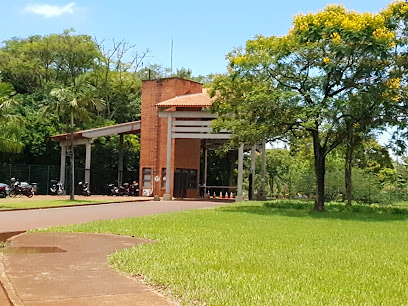
Refúgio Biológico Bela Vista/ ITAIPU
3.0 km
Immerse yourself in the vibrant biodiversity of Refúgio Biológico Bela Vista, a serene wildlife refuge in Foz do Iguaçu, Brazil, dedicated to conservation.
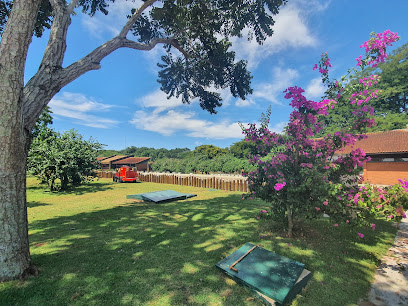
Mirante do Vertedouro - Turismo Itaipu
3.1 km
Experience the breathtaking views of the Itaipu Dam at Mirante do Vertedouro, a must-see tourist attraction in Foz do Iguaçu.

Templo Budista Chen Tien
3.4 km
Experience tranquility and cultural richness at Templo Budista Chen Tien, a serene Buddhist temple in Foz do Iguaçu surrounded by beautiful gardens.

Mirador Resalto
3.5 km
Discover stunning panoramic views and natural beauty at Mirador Resalto, a must-visit attraction in Hernandarias, Paraguay.

Mirante Central - Turismo Itaipu
3.7 km
Experience the breathtaking views of the Itaipu Dam at Mirante Central, a must-visit tourist attraction in Foz do Iguaçu, Brazil.

Itaipu dam
3.9 km
Discover the extraordinary Itaipu Dam, an engineering wonder and a key source of renewable energy, nestled between Brazil and Paraguay.

REPRESA ITAIPÚ
4.3 km
Experience the awe-inspiring Represa Itaipú, a historical landmark and engineering marvel, surrounded by stunning natural beauty in Brazil.

Represa Hidroeléctrica Itaipú Binacional
4.4 km
Explore the Itaipu Hydroelectric Power Plant, a breathtaking engineering feat and one of the world's largest hydroelectric facilities, set against stunning natural beauty.

Essential places to dine
Origami Sushi Bar & Grill
5.3 km
Experience the best of Japanese culinary traditions at Origami Sushi Bar & Grill in Ciudad del Este, offering fresh sushi and delightful grill options.

Comedor y Pescadería Itaipú
5.4 km
Experience authentic Paraguayan seafood at Comedor y Pescadería Itaipú - where fresh catches meet local flavors in Hernandarias.
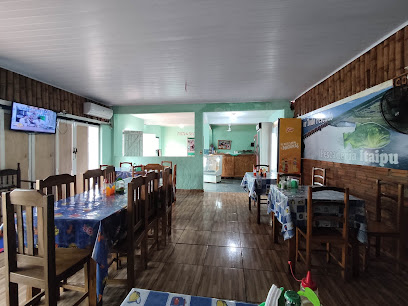
Restaurante Barracão
5.5 km
Savor authentic Brazilian cuisine at Restaurante Barracão in Foz do Iguaçu - where every meal is a celebration of flavor.
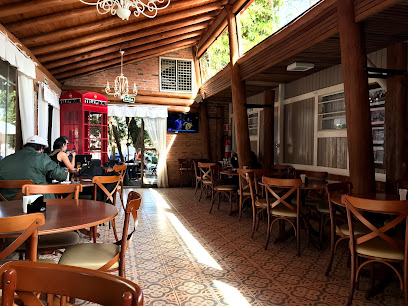
Eco Bar
5.6 km
Discover the flavors of Paraguay at Eco Bar in Hernandarias - where sustainability meets exquisite dining.

LA TORADA GRILL BAR
5.7 km
Experience the rich flavors of Paraguay at La Torada Grill Bar - a culinary delight in Hernandarias offering exquisite grilled dishes.

Beduino's Comida Árabe
5.7 km
Discover the rich flavors of authentic Middle Eastern cuisine at Beduino's Comida Árabe in Foz do Iguaçu.

Parrilla completa y picadas San fra
5.7 km
Experience authentic Paraguayan cuisine with exceptional grilled meats at Parrilla Completa y Picadas San Fra in Hernandarias.

Delicias Ña Aurora
5.7 km
Experience the best of fast food at Delicias Ña Aurora in Hernandarias—where local flavors meet a lively gastropub atmosphere.

En lo de Carlitos
5.8 km
Experience the authentic flavors of Paraguay at En lo de Carlitos in Hernandarias – where every meal tells a story.

Ñande Roga
5.9 km
Discover the delicious world of burgers at Ñande Roga in Hernandarias – where every bite is a taste of paradise!

El Mariscal Burguer
6.1 km
Experience mouthwatering burgers and friendly service at El Mariscal Burguer in Hernandarias - A fast food gem not to be missed!

Lo De Lola
6.2 km
Experience authentic Paraguayan cuisine at Lo De Lola in Hernandarias - where flavors come alive in a cozy atmosphere.

Big Pizzas Hernandarias
6.4 km
Discover delicious pizzas at Big Pizzas Hernandarias – where flavor meets value in every slice!

Ross Lounge
6.4 km
Discover the perfect blend of dining and nightlife at Ross Lounge in Hernandarias – where every meal becomes a celebration.

Diana Burger
6.4 km
Discover delicious gourmet burgers at Diana Burger in Hernandarias - where fresh ingredients meet vibrant flavors.

Markets, malls and hidden boutiques
Simoni Errera Store
5.6 km
Explore stylish women's clothing at Simoni Errera Store in Foz do Iguaçu – a fashion destination blending local flair with contemporary designs.

Loja Quiz Vila A
5.6 km
Explore Loja Quiz Vila A in Foz do Iguaçu for trendy women's fashion and unique accessories that reflect the latest styles.

Tienda de Artesanía Centro Visitantes Itaipu
5.7 km
Explore the vibrant artistry of Paraguay at Tienda de Artesanía Centro Visitantes Itaipu, where every souvenir tells a story.

POP TOP - Vila A
5.7 km
Explore POP TOP - Vila A for the latest trends in women's fashion in the heart of Foz do Iguaçu, where style meets local charm.

Amor Folk
5.7 km
Explore Amor Folk in Hernandarias for unique Paraguayan souvenirs and local craftsmanship that captures the heart of Paraguay.

Memórias Store - Cestas, Presentes & Personalizados
5.7 km
Discover unique gifts, personalized items, and photography services at Memórias Store in Foz do Iguaçu, a true treasure for travelers.

Empório da Vila Foz, Produtos Naturais , Suplementos , creatina e whey protein ( Unidade 1 Vila A )
5.8 km
Discover natural health products at Empório da Vila Foz - your go-to health food store in Foz do Iguaçu for supplements and organic treats.

Malu Store
5.8 km
Explore Malu Store in Hernandarias for unique Paraguayan gifts and authentic local handicrafts that capture the essence of your travels.

JuaniStore & Design
6.2 km
Explore JuaniStore & Design in Hernandarias for unique and stylish clothing that reflects local culture and fashion trends.
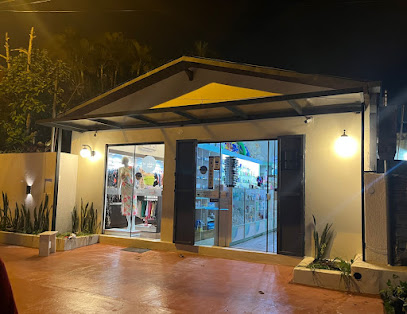
Arcadia Store
6.3 km
Explore Arcadia Store in Hernandarias for trendy youth fashion that reflects the vibrant local culture and style of Honduras.

La Boutique
6.4 km
Discover unique handcrafted treasures at La Boutique in Hernandarias – where local artistry meets charming shopping.

Tienda G&G
6.4 km
Explore the charm of Tienda G&G in Hernandarias, Paraguay, where unique gifts and local craftsmanship await every visitor.

A tu Medida shop
6.4 km
Explore A tu Medida in Hernandarias for trendy women's clothing and a unique shopping experience that captures the spirit of local fashion.

ECO FASHION - Moda Sostenible
6.5 km
Shop sustainably at ECO FASHION in Hernandarias, where style meets eco-consciousness for a fashionable future.

Pauli Shop
6.5 km
Explore the literary treasures of Hernandarias at Pauli Shop, your go-to destination for books and local culture.

Essential bars & hidden hideouts
Babylon Cocktail Bar
5.3 km
Experience the artistry of mixology at Babylon Cocktail Bar, Hernandarias' premier destination for unforgettable cocktails and vibrant nightlife.

Bar Maderinha - Foz Do Iguaçu
5.5 km
Experience the vibrant nightlife at Bar Maderinha in Foz Do Iguaçu, a perfect blend of relaxation, great drinks, and lively entertainment.
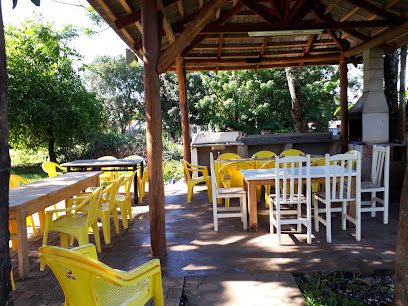
Hookah time lounge bar
5.6 km
Discover the soothing ambiance and delightful flavors at Hookah Time Lounge Bar, a perfect spot for relaxation in Hernandarias, Paraguay.

HOOKAH BAR
5.7 km
Discover the vibrant nightlife of Hernandarias at the ultimate hookah bar, blending tradition with modern flavors for an unforgettable experience.

Hype Bar Foz
5.9 km
Discover the vibrant nightlife of Foz do Iguaçu at Hype Bar, where exceptional cocktails and a lively atmosphere await every visitor.

Paiol Tap House
6.1 km
Experience the lively atmosphere and craft brews at Paiol Tap House, a must-visit bar in Foz do Iguaçu's Lancaster neighborhood.

Ágora - Bar & Lounge
6.1 km
Discover the vibrant nightlife at Ágora - Bar & Lounge in Hernandarias, where delicious drinks and a lively atmosphere await every visitor.

Quinta Ágora
6.1 km
Discover the lively Quinta Ágora in Hernandarias, Paraguay—a vibrant pub offering local flavors, live music, and a welcoming atmosphere for an unforgettable night out.

The Golden Hookah - Bar & Lounge
6.2 km
Experience the vibrant atmosphere of The Golden Hookah, a premier bar and lounge in Hernandarias, perfect for relaxation and socializing.

encontros bar
6.2 km
Experience the lively nightlife at Encontros Bar in Foz do Iguaçu, where great drinks and a welcoming atmosphere await.

Garden 49
6.2 km
Experience Garden 49: The Heart of Foz do Iguaçu's Nightlife with Unique Drinks and a Lively Atmosphere.

BEER HOUSE
6.3 km
Experience the lively atmosphere of Beer House, Hernandarias' top bar for craft beers and local brews, perfect for relaxation and socializing.

Ágora Terraza Bar
6.4 km
Discover the lively ambiance of Ágora Terraza Bar in Hernandarias, where great drinks meet stunning views and vibrant nightlife.

Narvato Tragos
6.6 km
Experience the heartbeat of Hernandarias at Narvato Tragos, where local drinks and vibrant nightlife come together in an unforgettable bar ambiance.

KEGS Irish Pub & Grill
6.6 km
Discover the charm of Ireland at KEGS Irish Pub & Grill, offering authentic cuisine and a lively atmosphere in Hernandarias.




